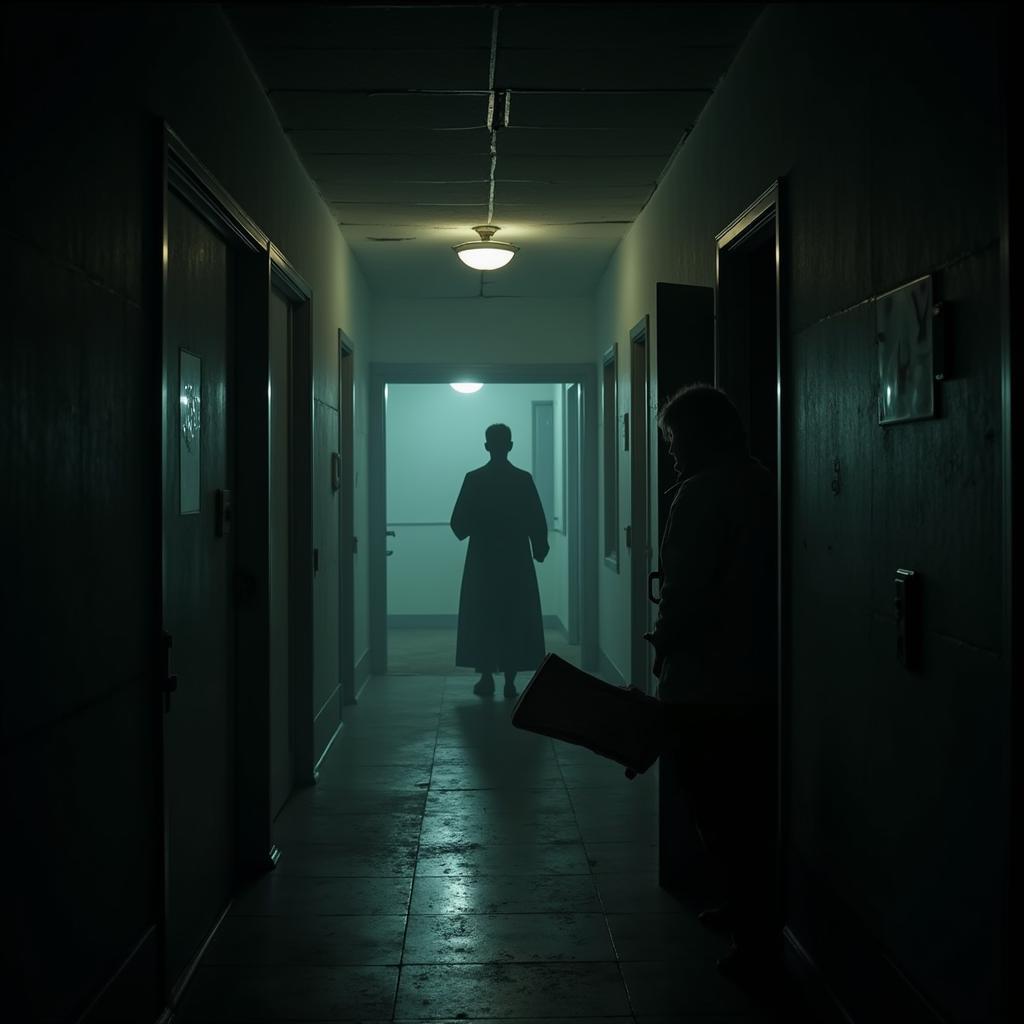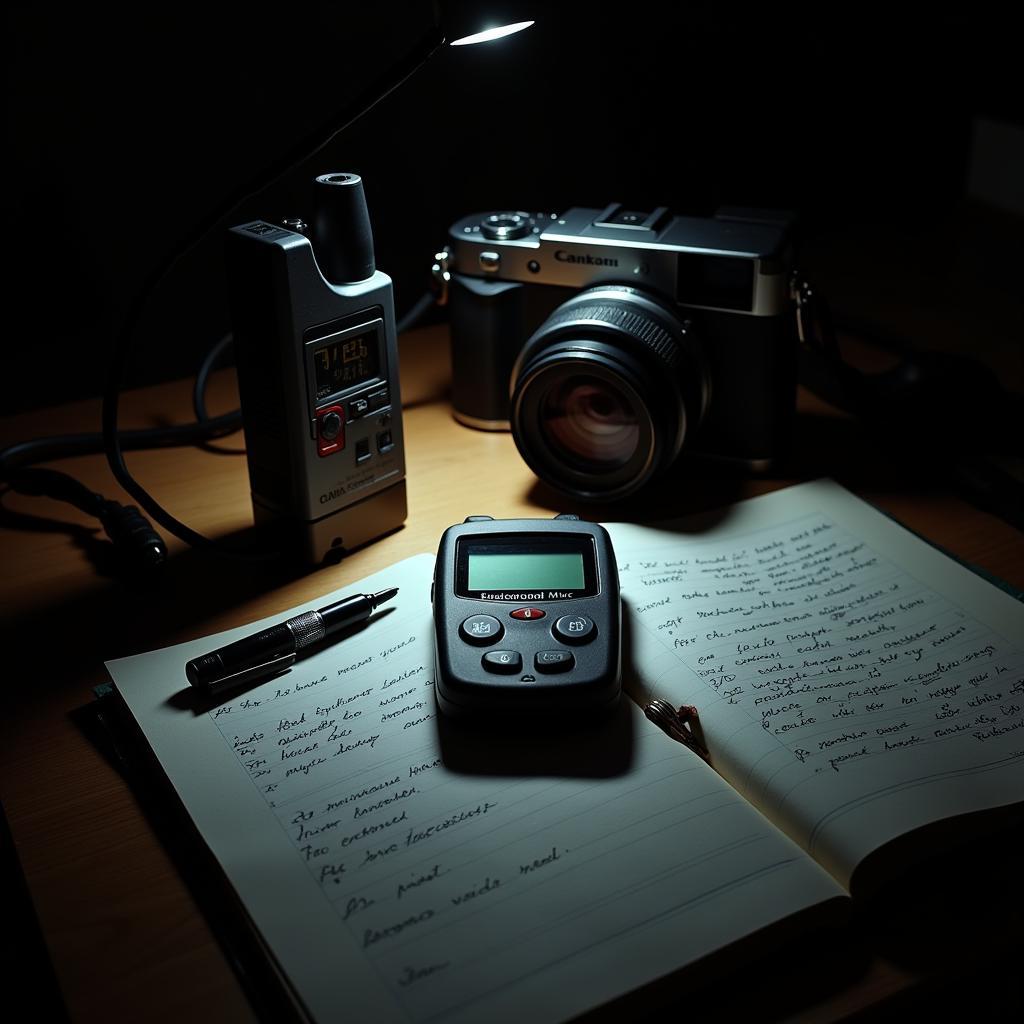Field Research Qualitative methods are essential for anyone intrigued by the unexplained, seeking answers beyond the realm of conventional science. This approach delves into the heart of paranormal phenomena, gathering firsthand accounts and observational data to shed light on the mysteries that captivate us.
 Paranormal field researcher taking notes
Paranormal field researcher taking notes
What Makes Field Research Qualitative So Different?
Unlike quantitative research, which focuses on measurable data and statistical analysis, qualitative research explores the “why” and “how” behind observed phenomena. It’s about capturing the nuances of experiences, beliefs, and perceptions related to the paranormal.
This type of inquiry is particularly valuable in paranormal research because it allows us to:
- Explore subjective experiences: Paranormal events often elicit strong emotional responses and personal interpretations. Qualitative methods help us understand the human side of these encounters.
- Uncover patterns and themes: By analyzing collected data, we can identify recurring themes, patterns, and potential explanations that might have been missed otherwise.
- Develop new hypotheses: The insights gained from qualitative research can inspire new avenues of investigation and refine existing theories.
Essential Tools for the Paranormal Investigator
 Essential tools for paranormal investigation
Essential tools for paranormal investigation
Venturing into the field requires more than just curiosity; it demands a systematic approach and specialized tools. Some essential equipment for paranormal field research includes:
- EMF Meters: Detect fluctuations in electromagnetic fields, which some believe might indicate spirit presence.
- Digital Voice Recorders: Capture EVPs (Electronic Voice Phenomena), sounds that are difficult to hear with the naked ear but may be revealed upon playback.
- Cameras: Document visual anomalies, from apparitions to unexplained light phenomena.
- Notebooks and Pens: Keep detailed records of observations, environmental conditions, and personal experiences during investigations.
Navigating the Challenges of Qualitative Field Research
Conducting field research in the context of the paranormal presents unique challenges:
- Subjectivity and Bias: Personal beliefs and expectations can influence both the researcher and those being studied.
- Ethical Considerations: Respecting privacy, obtaining informed consent, and dealing with sensitive information are paramount.
- Data Interpretation: Making sense of ambiguous data requires critical thinking, objectivity, and a willingness to consider multiple perspectives.
The Power of Storytelling in Paranormal Research
While data collection is crucial, effectively communicating findings is equally vital. Successful qualitative field research often involves:
- Thick Description: Providing rich, detailed accounts of observations, experiences, and the context in which they occurred.
- Triangulation: Seeking corroboration from multiple sources, such as eyewitness accounts, historical records, and scientific measurements.
- Reflexivity: Acknowledging the researcher’s own role and potential biases in shaping the research process.
 Paranormal research team discussing findings
Paranormal research team discussing findings
Delving Deeper: Exploring Related Research Methods
For those seeking a deeper understanding of qualitative research methods in the context of paranormal studies, exploring related disciplines can be invaluable. The following resources provide excellent starting points:
- Evaluating Research in Communication Disorders 8th Edition: While focused on communication disorders, this book offers a comprehensive overview of research methodologies applicable to various fields, including paranormal studies.
- Education Research Specialists Survey: This survey highlights the importance of rigorous research methods in understanding complex phenomena, a principle transferable to paranormal investigations.
- Field Research Sociology: Sociology often grapples with subjective experiences and social dynamics, making its research methods relevant to understanding the human element in paranormal encounters.
- Masters in Research: Pursuing advanced degrees in research methodologies can equip individuals with the skills and knowledge to conduct high-quality paranormal investigations.
- Successful Qualitative Research: A Practical Guide for Beginners: This guide provides a practical framework for conducting qualitative research, offering valuable insights for both novice and experienced paranormal investigators.
Conclusion
Field research qualitative methods provide a powerful lens through which to examine the enigmatic world of the paranormal. By embracing a systematic approach, utilizing appropriate tools, and adhering to ethical principles, we can gain a deeper understanding of the unexplained and contribute to the ongoing quest for knowledge in this captivating field.
If you’re ready to embark on your own journey of paranormal discovery, remember that careful observation, critical thinking, and a healthy dose of skepticism are your greatest allies.
For those seeking guidance and support in navigating the world of Paranormal Research, our team is here to assist you. Contact us at 0904826292, email us at [email protected], or visit us at No. 31, Alley 142/7, P. Phú Viên, Bồ Đề, Long Biên, Hà Nội, Việt Nam. Our dedicated team is available 24/7 to answer your questions and provide the assistance you need.